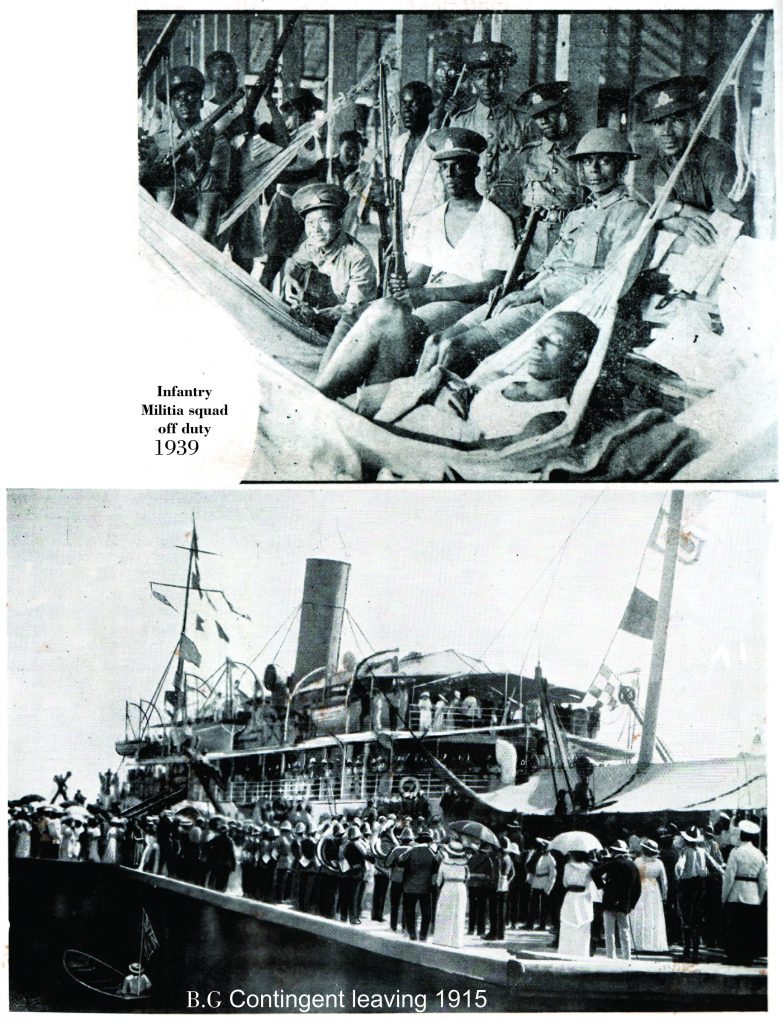Most of the modern certified Guyanese that I have attempted to engage the discourse of why the World Wars were of relevance brushed it aside with that usual air of certification, announcing that those terrible events were of no significance to us and were nothing but European civil wars. I became interested in those conflicts by the superficial titbits of exposure that came from men like ‘Law and Order’ and Mr. Westmaas, two famous eccentrics of diverse expressions. Law and Order would occupy space outside of Bettencourt and with his miniature gallows pronounce of street crimes with his famous metaphors, antecedents and parables. “Calling all choke and robbers gather around and keep yuh hands in yuh own pockets, sons of Fagin.”(I learnt who Fagin was much later). Then with parades especially the Memorial Day parade, Law and Order would adorn his military medals and pay his solemn respect. With Westmas, who did not leave these shores with the South Caribbean Regiment, but joined the British army and served in the artillery, his stories were different. Back then since we had no TV, the cinemas, toy soldiers, comic books and novels were our significant exposure to the World Wars and outside of Europeans and Caucasian Americans, the only other ethnic group visible on screens were the Japanese. That began to change in the mid-70s, with movies like ‘Salt in the wound’, ‘The Dirty Dozen’ and a few others. It is commendable that Lt. Colonel Gomes was featured showcasing two veterans on national TV, and well interviewed by Mark Watson asserting a part of our memory erroneously dismissed as just the colonial past, simplistically ignoring the fact that our colonial period is also our history.
I am a product of the post-Independence era that created the Guyanese awareness, expertly moulded by the Burnham era. I had already had creative work published when I approached the Director of Art, Denis Williams with a special Graphic novel project, to extract some financial support from the Department of Culture. We discussed the project and where I wanted to take it, he liked it, but then dropped the bomb: you need about 15 to 20 years exploring the events of the worlds you are addressing in your graphic universe. “All you know now is from Hollywood, which is nonsense. You need to read special books, I’ll give you a list, others you’ll find on your own,” he said. 
I supplanted the space with other works, in the years after that depressing engagement. I, however, have to admit that Dr Dennis Williams was right. I came to the conclusion that WWI and II were relevant even more to my holistic history after reading three mind rocking books. The first I bought from Shaka’s mom’s bookstore in South Ruimveldt, ‘The Race to Fashoda’ by David L. Lewis. The second, much later at Austin’s, ‘The Scramble for Africa’ by Thomas Pakenham. Then later I purchased on the Internet ‘The Devil’s Handwriting’ by George Steinmetz. These and other related text reinforced that the bright people in my country that thought that WWI and II were just European civil wars and had nothing to do with us were so wrong. A worldview and secret doctrine was created back then that enveloped us, to move on and redefine it. We have to understand it, clarify its subplots, then recognise that our modern historical perspective and references should begin with the rise of Islam to the present. Not from the arrival of the slave ships and our colonial period that instructed us as to the careers we should embrace, the value system that we should measure and extract our leadership from.
In Guyana, the events from the 1800s have shaped us even more dramatically. What the wars did is challenge us to defy the mocking myths that once defied and defiled us as black, yellow and brown peoples. Myths that demanded to show what we were truly made off, with the challenge of courage and with our blood in combat, that sacrifice became the liberating path to Independence. Hitler attempted the creation of the Third Reich (Realm) of German expansion but unveiled the restless ‘Third World’ instead. Trinidad is the only Caribbean country that has a profound Military museum that I’m aware of. I visited it through Darrel Woo, a friend from Trinidad in the late 80s. It’s privately owned. There’s a WWII fighter pilot’s statue on the way in with the names of fallen pilots. I’m not sure that its founder is still alive. I do hope that its structure and artifacts are preserved and that the museum is still around.
The recent rejections by the opposition of the government’s attempt to upgrade our obsolete copyright laws speak volumes about the patriotic interest in the preservation of our history, through the empowering of our creative minds. Minds that must be engaged to realise the vision and capture the public interest, to understand why we must preserve the ancestral being of this nation through records transferred into edutainment, drama and embracing imagery.


.jpg)











